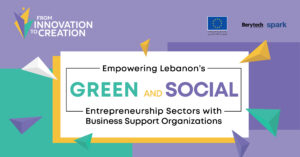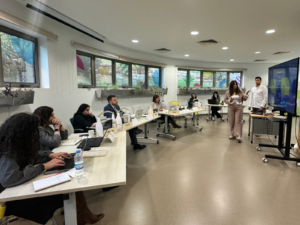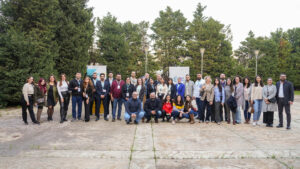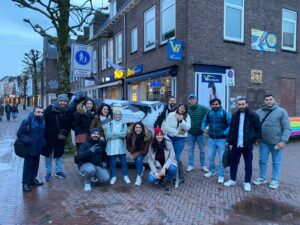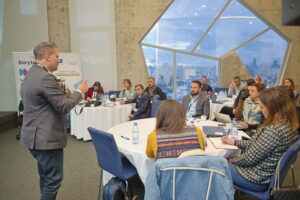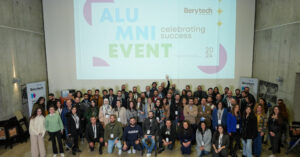
At Berytech we truly believe that entrepreneurship and social impact go hand in hand. This is why we have dedicated a series of articles and portraits on social entrepreneurship in Lebanon.
The garbage crisis, the water crisis, the energy crisis… What if all these problems hid formidable economic opportunities? This is how “social entrepreneurs” see the world: they create companies with the aim to solve the many challenges that society faces. That’s how Lebanese social enterprise Compost Baladi, which provides waste management products and services, was born in 2017 to tackle the garbage crisis. That’s also how Clean2O’s team came up in 2018 with the idea of an easy-to-use chemical and physical filter which gives anyone access to clean drinking water. And that’s how Sunray Energy makes solar energy affordable since 2017 by combining solar energy with an innovative financing system. And the list goes on.
According to Makesense Organisation, which helps entrepreneurs solve environmental and social topics, in 2017 there were at least 200 social enterprises in Lebanon.
But what exactly is a social enterprise?
Simply put, “A social enterprise is a company which combines social impact and financial sustainability,” explains Krystel Khalil, Programs Director at Berytech. The definition may sound simple. However, there is currently a raging worldwide debate about what social impact entails, and what exactly defines financial sustainability.
Is creating jobs considered a social impact? How do you measure your impact? Do you have to be fully sustainable to be a social enterprise?
Social entrepreneurship is not limited to conducting Corporate Social Responsibility (CSR) activities. Nor is it to selling cosmetics and dedicating a small part of your marketing budget to protect the environment. It is neither limited to being an NGO and changing the world while relying on funds, private donations, and the occasional sale of products at fairs or events to make ends meet.
No, social entrepreneurship is about having the mission of an NGO with the business model of a private enterprise.
Today, definitions of social entrepreneurship are being elaborated country by country. Most often there is no legal status, hence no legal definition, of what makes a social enterprise – which is often registered as an NGO, or commercial entity, or both. It is usually social entrepreneurship associations in each country that define and write down their own criteria.
And that’s what the Lebanese Social Enterprises Association (LSE) is trying to do. The current draft states that: “A social enterprise is a company whose original mission is to solve a social or environmental problem while aiming at financial viability and reinvesting the majority of its profits in its social impact.”
Social Entrepreneurship Is Not New!
If the term is on everybody’s lips today, it is not actually new. One of the first social enterprises in Lebanon is actually a brand we all know well, though you might not know it as a social enterprise per se: L’Artisan du Liban!
Yes, the company you’ve been buying your gifts from for your friends abroad has been helping Lebanese craft people live from their art for 40 years.
“By helping Lebanese craft people who live in remote areas sell their products, we contribute to the social and economic development of the country while preserving its heritage,” explains Roula Haidar, General Manager at l’Artisan du Liban. “We saved at least four crafts from extinction and have supported more than 1,000 artisans across the Lebanese territory.”
In addition to l’Artisan du Liban, there are other companies which you may mistake for NGOs, and not consider them social enterprises. That’s the case of Arcenciel for example, which was founded in 1985 with the aim to help marginalized people and communities get integrated back into society. Their goal is purely social, but like any private company, Arcenciel generates revenues from the sale of its products and services. These revenues cover 65% of their costs for now, and this number keeps increasing.
More recently, an initiative that you probably believed was only a social media trend is actually a social enterprise. We’re talking about Live Love Beirut, which pursues a mission to share, celebrate and help the beauty of Lebanon. They generate revenues from the sale of their storytelling skills, from ad placements and tourism trips.
Why do social entrepreneurs matter so much for Lebanon?
Because, sadly, we have lots of problems in Lebanon and our government doesn’t do much. “It’s very obvious that any change in this country is not going to come from the government,” says Omar Itani, founder at Fabricaid, a second-hand clothes collector and distributor who was coached by Berytech and who recently won the Global Social Venture Competition (GSVC) – the world cup for social enterprises. “You can either shy away and complain or get fed up and leave the country. Neither attitude solves anything.”
And there is a lot to solve!
In Lebanon, the poverty rate has increased by 110% since 2011, and there are 3.3 million people considered ‘in need.’ Public institutions are weak and international aid can only ensure half of the needs on the ground according to the 2015-2016 Lebanon Crisis Response Plan. The infrastructures are decaying, and brain drain is still a very harsh reality. According to the World Bank, about 40% of male and 30% of female graduates migrate from Lebanon in search for better job opportunities abroad.
In other words, we need solutions to everything, in all areas. And we need to create jobs. Therefore, the development of social entrepreneurship, among others, is essential. Especially that it has already proven that it can work!
Lebanese startups such as Fabricaid, SE Factory (a coding bootcamp), Jaleesa (a babysitter provider), Yalla Bus (a Lebanese bus assistance platform), Koullouna (a subscription box that aims to connect all Lebanon lovers to the country), Easy Wall (which assembles colorful plastic cubes made out of recycled bottles), M Social Catering (a catering company), have created in the space of two years hundreds of jobs for underprivileged people, catered to some of Lebanon’s most pressing social and environmental issues, and provided a livelihood to hundreds of families.
And that might be just the beginning. The good news is that this new generation of changemakers which has emerged in the past few years is getting increasing support and mentoring thanks to a developing ecosystem.
So… why Social Entrepreneurship now?
We are not really sure why social entrepreneurship is such a hype these days in Lebanon. It is true that globally, the world seems to have awakened to the many virtues of social entrepreneurship. Moreover, specialized funds, called impact funds, have emerged along with a whole generation of passionate but down-to-earth changemakers.
In Lebanon, it might be that people are getting ready for the time when impact investment comes to Lebanon. It might also be that people are fed up and have realized that they had a choice, that if they wanted anything to function, they had to do it themselves. It might also have to do with the fact that entrepreneurship, in general, is trendy, and any offspring of it, such as social entrepreneurship, was bound to develop.
Whatever the reason, one thing is for sure: there is an ecosystem that is slowly and surely building up around social entrepreneurship. And several entities have already positioned themselves to encourage this trend. Generally speaking, we have the enablers, incubators, and accelerators such as Makesense, AltCity, Berytech, DOT Lebanon, Global Compact Network Lebanon, and the Diane Foundation. They all help entrepreneurs develop their ideas and turn them into sustainable businesses. And we have the few funds, such as Alfanar Venture Philanthropy and The Viridis Fund from the Diane Foundation which bring in much-needed investment to social startups which show potential.
Alfanar helps social enterprises in the Arab Region by providing tailored technical and financial support to ambitious grassroots organizations, helping them to achieve lasting social change in their communities. They give special – but not exclusive – focus to investments that improve children’s education and women’s economic empowerment, convinced that influencing change in these areas will help boost wider social and economic development.
But it is not enough.
What is missing?
“Being social is costly and time-consuming,” says Samer Sfeir, founder at M Social Catering, Proabled, and Hum&Go, social organizations which train marginalized people and help them get a job.
It takes time to find a sustainable business model, and very often, social entrepreneurs can’t find the funds and/or resources to help them reach this so-called “scale-up” phase.
“We struggle to expand, hire, educate customers,” explains Sfeir. “And as soon as we grow a bit, we face unfair competition from corrupt businesses whose owners use their connections to win the most important projects.”
In other words, it is easier to start a social enterprise than to grow it in the current environment. It is actually so hard that many have failed and shut down in the past year.
“It’s a pity because they had potential,” says Sfeir. “And that’s how we got the idea to create the Lebanese Social Enterprise Association one year ago”.
Samer and his partners in the project – one of them being Arcenciel – are working on the development of a label that would certify Lebanese social enterprises. The objective is to organize the social entrepreneurship sector in Lebanon. They want to give this sector credibility and help attract international funds and donors which are more sensitized to impact investment.
This is important because investment with a cause doesn’t follow the same rules as traditional VC funding. Typically, though not always, the return on investment is lower, but investors are usually okay with that as long as the social impact is worthy.
In short, it is a question of changing the culture. As Diane Fadel from the Diane Foundation says it so well, “we aim to change the Lebanese mindset and attitude. We invite everyone to take action and impact our society.”
Here’s what Berytech is Doing
Berytech has been the Regional Partner of The Global Social Venture Competition since 2012. GSVC is a global competition that empowers the next generation of social entrepreneurs to transform their ideas into fundable, scalable ventures that address the world’s most pressing challenges. Last year, FabricAid won the international finals over 550 startups, but before winning at the global finals, they had locally won six months of incubation at Berytech including: master entrepreneurship classes, work sessions with leading experts and coaches, access to workshops and events, access to local and international networks, support in accessing grants and funds, six-month access to the Berytech co-working space, coaching and preparation to present a business plan in the finals, and access to follow-up support programs in social entrepreneurship. Application for the 2018-2019 competition are now open. Learn more about the competition by clicking here.
Berytech is also working on a new program aiming to boost the local economies of marginalized areas in the North, Mount Lebanon, Bekaa, Beirut, and South Lebanon through the support of social entrepreneurship startups and training business coaches and mentors. The objective of this program is to build the capacity of Lebanese social entrepreneurs, providing them with access to network opportunities and visibility as well as with micro-grants to develop marketing and business strategies. The official announcement of this new Berytech program is planned for November 2018.


